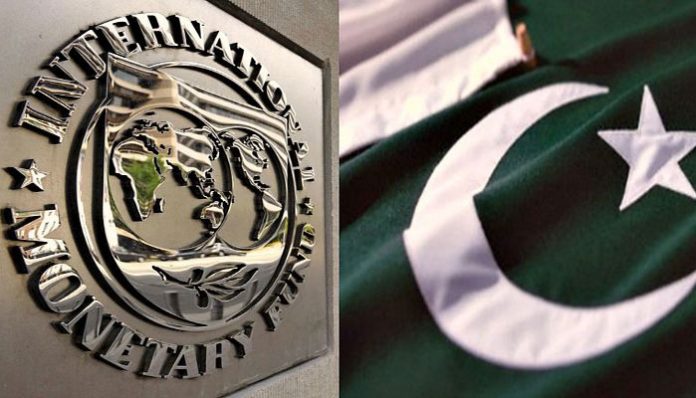- IMF team accepts govt’s stance of not further jacking up electricity prices
- Lauds govt’s approach towards the state-owned loss-making organisations
- Repayment of IMF loan taken in 2013 will start from June this year
ISLAMABAD: The government has reportedly decided to take up to $6 billion loan from the International Monetary Fund (IMF) from the next fiscal year.
Sources told Pakistan Today that the government’s economic team and the international lending organisation has reached an agreement in their recent communication. “IMF has agreed to give the loan on Pakistan’s conditions,” they claimed.
According to details, Pakistan has assured the lending organisation that the government would make reforms in the Federal Board of Revenue besides increasing the revenue at 1.5pc of the GDP from next fiscal year.
Earlier, it was reported that the finance minister had refused to revise the revenue target of FBR despite the shortfall of Rs188 billion in the first seven months.
Sources claimed that the economic team also assured the lending organisation that the government would increase the spending on its social safety network.
In the budget presented in April 2018, the allocation for Benazir Income Support Progamme (BISP) had raised to Rs124.7 billion for the fiscal year 2018-19 and the PTI government, in its manifesto, had stated that it would increase the funding for the downtrodden segment of society.
Sources further claimed that the PTI government assured the IMF team that expenditure would be further cut down to 10pc.
“IMF team also accepted the government’s stance for not further jacking up the electricity prices, as the team is satisfied with the recent measures pertaining to electricity prices,” they added.
Sources said that the IMF team expressed satisfaction with the government’s approach towards the state-owned loss-making organisations, as the government is establishing Sarmaya Pakistan Company to revive around 200 loss-making organisations.
The Pakistan Muslim League-Nawaz (PML-N) government had also borrowed $6.2 billion from IMF in 2013 under the extended fund facility for a period of three years.
Sources said that the repayment of IMF loan taken in 2013 would start from June this year and the government would “repay the loan by getting another loan up to $6 billion”.
Pakistan had formulated a Memorandum of Economic and Financial Policies (MEFP) for discussion with IMF in November last year in which the economic team informed that the authorities had devised a homegrown stabilization plan so that an orderly adjustment can take place in the fiscal year 2019.
The assumptions and the contours of the short-run stabilization plan for the next fiscal year were aimed at increasing the foreign reserves from $11 billion to $13 billion, remittances $21 billion, foreign direct investment $3 billion, exports $27 billion, imports curtailment up to $54 billion, and current accounts deficit $12 billion.
The government also shared that the PKR-USD parity had depreciated by 31pc and the policy rate had increased by 425 points cumulatively since December 2017 on the monetary and exchange rate policies front.
Significantly, the prime minister had abolished discretionary spending powers for the president, prime minister, ministers and governors to enforce fiscal discipline. Similarly, the government had also taken an unprecedented measure whereby all proposals for supplementary grants are now to be approved by the Federal Cabinet rather than the Ministry of Finance.
Talking to Pakistan Today, Ministry of Finance spokesman Dr Khaqan Najeeb did not say anything about the finalisation of the agreement, but stated that “productive dialogue continues with IMF on all areas including fiscal, energy, structural reforms and monetary policy”.
He said the interaction between Pakistan and IMF is being done through local meetings, phone calls, video conference and emails, adding that the two sides continue to exchange views on the reform framework to move forward.
“The discussions are part of regular ongoing interactions between the government and IMF and will continue in the coming weeks as well,” he concluded.





Big mistake by going to the IMF. PTI will regret it. Better to cut imports not by increasing the duties but banned the items but required. Big mistake.
Pakistan has signed the FTA according to which Pakistan can not directly ban any legal import item …and by the way what imports items Pakistan should ban ?
Wise decision! IMF programs bring credibility to economic conditions of the country, builds confidence of investors and force government institutions to bring discipline in their way of workings. All we need is to spend the money wisely.
Imf made Pakistan a basket case. Before 1989 Pakistan was doing better than India and Bangladesh. Then the IMF Hitmen with Dual Nationality and Multiple entry Visas for the Western destinations were planted in the Team of BB to ensure Pakistan asks for IMF package. Ever since one IMF package ensures next IMF package.
2. With CPEC, Pakistan does not need to follow the old trajectory.
3. Pakistan needs Comprehensive Policy Reforms in every sector and not IMF package. Pakistan Reforms should begin with Agriculture, Taxation and Civil Service and be accompanied by Education, Overseas Pakistanis, SEZz and two dozen other Sectors.
4. Going to IMF on their stringent terms will be the biggest blunder of the Government.